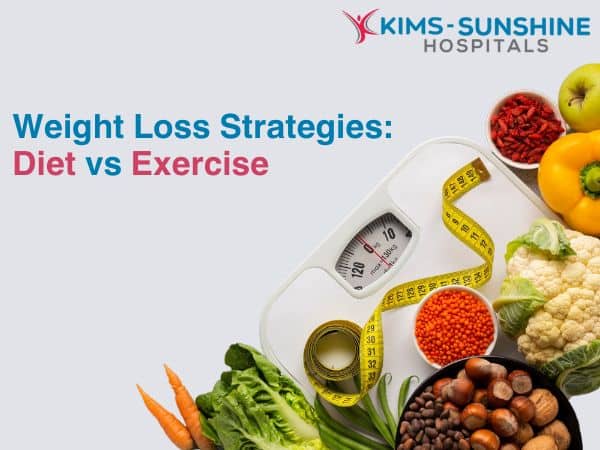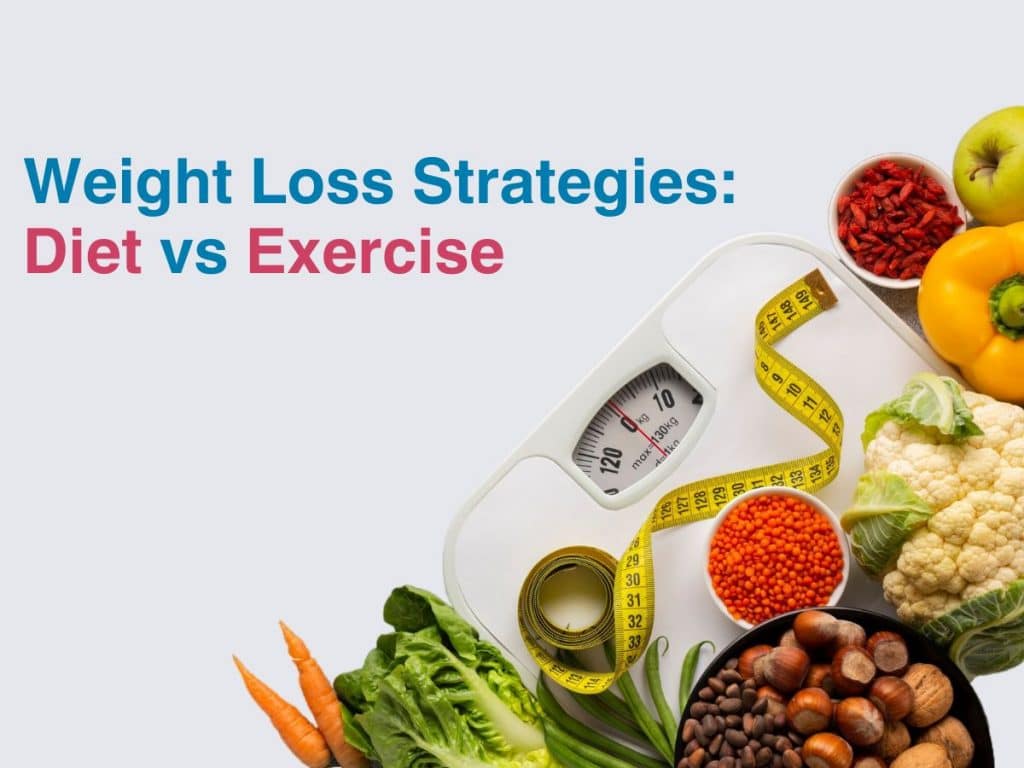
Weight Loss Strategies: Diet vs Exercise

Ladies and gentlemen, we have assembled today to find an answer to the question of the age-old debate: exercise or diet?
Let’s get right to it!
Our first contender is – Exercise!
When it comes to shedding pounds, exercise is your trusty companion.
It not only burns calories but also preserves muscle mass and boosts metabolism.
Whether you prefer jogging, cycling, or hitting the gym, incorporating regular exercise into your routine is essential.
Exercise Routines for Weight Loss: Implementing structured exercise routines tailored to your fitness level and goals can accelerate your journey towards shedding those extra pounds.
There’s a myriad of options to explore, from high-intensity interval training (HIIT) to strength training.
Each routine offers unique benefits, catering to diverse preferences and fitness levels.
How Much Exercise is Needed for Weight Loss: Striking the right balance between duration and intensity is crucial for effective weight loss through exercise.
Aim for at least 150 minutes of moderate-intensity exercise per week, supplemented by strength training sessions.
This combination not only maximizes calorie burn during workouts but also promotes muscle growth and overall well-being.
Looks like that’s at least 3 points for exercise!
Next up in the ring, we have the formidable opponent – Diet!
They say abs are made in the kitchen, and they’re not wrong.
A healthy diet forms the bedrock of weight loss success! It helps limit your calorie intake and provides essential nutrients to fuel your body’s journey towards overall wellness.
Best Diet for Weight Loss:Focus on whole, nutrient-dense foods to pave the way for sustainable weight loss.
A couple of good options include:
Plant-Based Diet: A plant-based diet centers around whole, unprocessed plant foods, such as fruits, vegetables, grains, legumes, nuts, and seeds, while minimizing or eliminating animal products. This approach is rich in fiber, vitamins, minerals, and antioxidants, promoting weight loss and reducing the risk of chronic diseases. By emphasizing plant foods, it encourages a lower calorie intake and supports sustainable weight loss.
Flexitarian Diet: A flexible approach to vegetarianism, the flexitarian diet encourages plant-based meals while allowing for the occasional consumption of meat and fish. By focusing on fruits, vegetables, whole grains, and plant-based proteins like beans and tofu, it supports weight loss through increased fiber intake and reduced calorie density. Flexibility in food choices makes it easier to adhere to in the long term, promoting sustainable weight loss.
Paleo Diet: Inspired by the dietary patterns of our Paleolithic ancestors, the Paleo diet emphasizes whole foods such as lean meats, fish, fruits, vegetables, nuts, and seeds while excluding processed foods, grains, dairy, and legumes. Prioritizing nutrient-dense foods and eliminating processed ingredients, can lead to weight loss and improved metabolic health. However, it may require careful planning to ensure nutritional adequacy.
Vegetarian Diet: A vegetarian diet abstains from meat, poultry, and seafood, focusing instead on plantbased foods like fruits, vegetables, grains, legumes, nuts, and seeds. This approach offers numerous health benefits, including weight loss, reduced risk of chronic diseases, and improved digestion. By emphasizing nutrientrich plant foods and incorporating a variety of protein sources like beans, lentils, and tofu, vegetarian diets support sustainable weight loss while promoting overall wellbeing.
Indian Diet: The traditional Indian diet is rich in vibrant flavors, aromatic spices, and a diverse array of plant-based foods. With its emphasis on lentils, pulses, vegetables, whole grains, and spices, Indian cuisine offers a wealth of options conducive to weight loss. Dishes like dal (lentil soup), sabzi (vegetable stirfry), chana masala (chickpea curry), and roti (whole wheat flatbread) are not only delicious but also packed with nutrients and fiber. By incorporating these flavorful dishes into your meal planning, you can enjoy the benefits of sustainable weight loss while savoring the tastes of India.
Low-Carb Meals: Low-carb meals, characterized by their reduced carbohydrate content, have gained popularity for their ability to promote weight loss. By limiting carbs and focusing on protein and healthy fats, these meals help regulate blood sugar levels, reduce cravings, and facilitate fat burning. Foods such as lean meats, fish, eggs, nuts, seeds, and nonstarchy vegetables take center stage in low-carb eating plans. Embracing this approach encourages steady weight loss while providing sustained energy levels throughout the day.
Mediterranean Diet: Renowned for its heart-healthy benefits, the Mediterranean diet offers a flavorful and nourishing approach to weight loss. Centered around the traditional eating patterns of countries bordering the Mediterranean Sea, this diet emphasizes whole foods such as fruits, vegetables, whole grains, legumes, nuts, seeds, and olive oil. Additionally, moderate consumption of fish, poultry, and dairy, along with occasional red wine, contributes to its appeal. Rich in antioxidants, fiber, and healthy fats, the Mediterranean diet not only supports weight loss but also promotes overall wellbeing, cardiovascular health, and longevity.
Meal Planning for Weight Loss:
Planning your meals turns the confusion of eating into a wellorganized plan for healthy eating.
If you’re wondering how to plan meals that support your weight loss goals, you can follow these simple steps:
Batch Cooking: Set aside some time each week to prepare batches of healthy meals in advance. This can save you time and ensure you have nutritious options readily available when hunger strikes.
Portion Control: Be mindful of portion sizes to avoid overeating. Use smaller plates, bowls, and utensils to help regulate portion sizes and prevent excess calorie intake.
Mindful Eating: Practice mindful eating by paying attention to your body’s hunger and fullness cues. Slow down and savor each bite, focusing on the taste and texture of your food. This can help prevent mindless snacking and promote healthier eating habits.
By incorporating these simple meal planning strategies into your routine, you can support your weight loss journey and make healthier choices effortlessly.
Diet gets 5 points for all the benefits it gives!
Finding Your Balance
Achieving a calorie deficit, a cornerstone of weight loss requires a balanced approach.
While a healthy meal plan is crucial, solely relying on diet can pose challenges due to food restrictions.
However, adopting the 80-20 rule—whereby 80% of your efforts focus on meal planning and 20% on exercise—can set you on the right path.
In the ongoing debate between low-carb diets and exercise for weight loss, there’s no one-size-fits-all solution.
Instead, finding your balance is key.
Experiment with different dietary approaches, exercise routines, and lifestyle modifications to discover what yields the best results for you.
By combining the power of diet and exercise you can unlock benefits beyond weight loss.
Improved metabolic health, enhanced mood, increased energy levels, and reduced risk of chronic disease are just a few of the rewards that await those who embrace a holistic approach to wellness.
Conclusion
The path to weight loss success is paved with a blend of diet and exercise.
Rather than viewing them as competing forces, embrace them as complementary components of a holistic approach to wellness.
With dedication, consistency, and a willingness to experiment, you’ll uncover the winning formula for achieving your weight loss goals and living your healthiest life.
If you need help finding the right diet plan, an expert like a nutritionist can help!
Frequently Asked Questions

Dr. Raju Musham
MBBS, DrNB (Gen. Surgery),DrNB (Surgical Gastro)
Jr. Consultant Surgical Gastroenterologist






